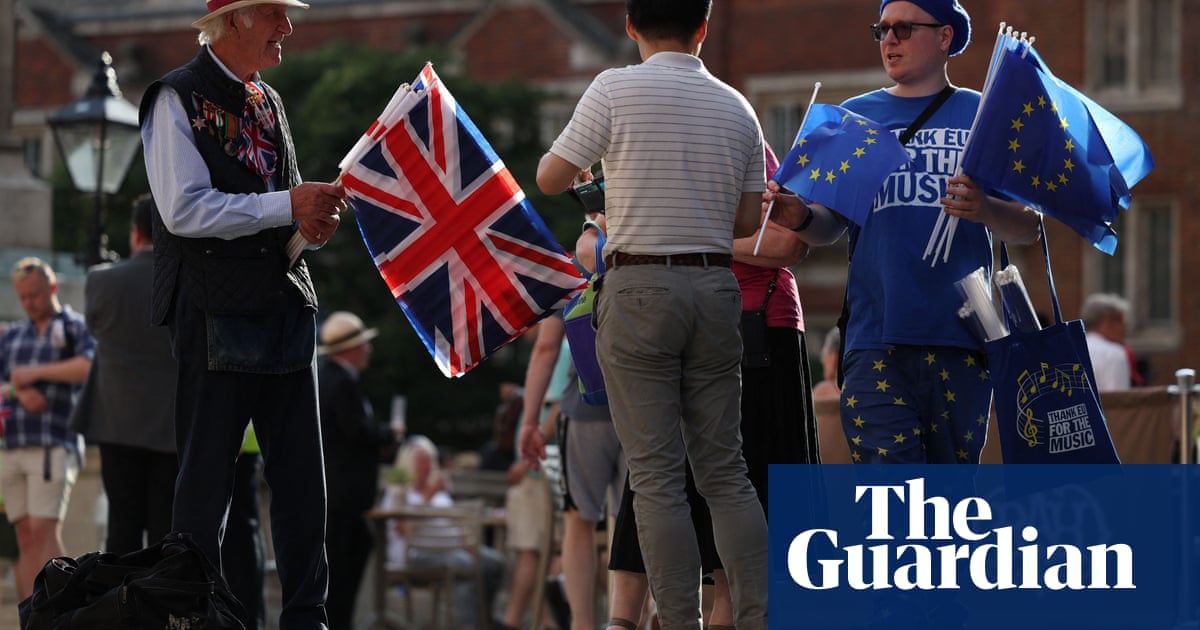
‘Think of it as a national show not a concert’
The Last Night of the Proms is a fantastic opportunity for classical music to reach audiences across the UK. This wonderful event must be forward-looking, rather than scanning backwards to old tropes of empire – however good the tunes. It is the ultimate programming challenge.
It is the party for the loyal Proms audience, but it must also attract those who wouldn’t dream of attending a classical concert. It must have performances of the very highest standard as well as audience participation – but it needs new songs. It should reflect diverse Britainin all its multicultural glory. It needs to be driven by the new generation of classical performers, whose virtuosity can enthral those who think this music is closed to them.
It should be thought of as a national show and not a concert. Shows need directors. Artists such Nicholas Hytner and Phyllida Lloyd (Mamma Mia! at the Proms, anyone?) work wonderfully across classical music, theatre and film. Danny Boyle’s masterful opening ceremony for the 2012 Olympics can be a template, using wonderful performers to involve and entertain a huge audience while making some very serious points along the way. So, refresh the Last Night by inviting a guest curator each year, give them the impossible brief above, and let the fun begin.
James Waters, director Lammermuir festival and creative director classical music, Perth Concert Hall
‘Call on the poets’
Saturday’s concert will be conducted by a Finn, will feature a Latvian accordionist playing Argentinian tango, music by an Iranian and African American female composers, and an Australian singing Wagner in German. But it will be as the evening draws to its conclusion that we find ourselves on the frontline of the culture wars with the ritual elements of the Last Night: the patriotic songs. As a child in the 1970s growing up near Glasgow, I loved it, and my Scottish family gathered round the telly and sang about England’s green and pleasant land and how Britannia ruled the waves – and I practised my conducting to a crackly 78 of Elgar’s Pomp and Circumstance March No 1.
But, even if I love those tunes, the world is different now. The very idea of Britishness is under strain in the UK nations. After a year in which a brutal light has been shone on the enduring legacy of slavery, it sticks in the throat to belt out a song written in 1740 as the transatlantic slave trade reached its climax; “Britons never shall be slaves” – other people yes, Britons never. It feels uneasy to sing the blatantly expansionist line “Wider still and wider, shall thy bounds be set”, even if the words to Land of Hope and Glory were written on the cusp of the crumbling of the British empire and Elgar himself grew to hate their triumphalism. It’s only in the ecstatic vision of Blake’s Jerusalem that I feel I could comfortably give it laldy, as we would have said in Glasgow.
So what would I do instead? Luckily, I don’t have to solve this problem, but if I had to I would keep increasing the global diversity of the programme. And as for those patriotic songs? Because they are such great tunes (Beethoven especially loved Rule, Britannia!), I’d ask poets to rework the texts so that we could all sing them with enthusiasm; aspirational and generous texts about the expansion of ideas of freedom, justice, love and compassion for the world. Britain may be troubled by culture wars and inequality, but let’s aspire to better things.
Gillian Moore, director of music and performing arts, Southbank Centre, London
‘Turn it over to the young’
I never thought I would see the day in this country that politicians directly interfered in artistic programming, as happened last year. Beneath all the bombast it is profoundly chilling. I don’t envy the Proms team, who have to face the frothy rage of rightwing commentators if they even tweak the Last Night format in an attempt to undo the hurt that the imperialist content undoubtedly causes. It’s also very depressing that this one concert gets so much attention while the huge risks facing the future of music are blithely ignored by these self-same commentators – including those in government – the other 364 days of the year.
But given that, let’s take that attention and make it work for us. Music education is in crisis. Young people have had a truly terrible couple of years. So I would turn the evening over to youth ensembles to celebrate their achievements and highlight what is at stake if we don’t reverse the decline. I’d work with them to commission new music, including works by young people themselves. And I’d also keep the sea shanties as they are so very 2021.
Susanna Eastburn, chief executive, Sound and Music
‘Keep it complicated’
I was born in Northern Ireland and so now have two passports. I love Ireland and the UK, but feel an ambiguous citizen of both. Coming from a part of the world scarred by factionalism, I sometimes feel equivocal about any concert containing even the mildest hint of patriotic music. Post-conflict Northern Ireland has been created through a compromise that has enabled different politico-cultural identities to agree a way of living together. It’s not perfect but it works – and the Last Night of the Proms is attempting its version of that herculean task. It is a musical celebration that is seeking to hold space for the many conflicting identities of a 21st-century audience. This task is as complicated as we are ourselves as a society – and should be so. As an event, it is iconic, imperfect, re-imaginable and irreplaceable; a symbol of the modern conundrum of being British.
Annilese Miskimmon, artistic director of English National Opera and London Coliseum
‘More audience participation’
The programming of the Last Night had already long been contentious when I started working there in 1993. How do you strike a balance between the expectations of a wide audience who will be tuning in for the first time all summer, with the need to round off the season in a way that represents everything that the Proms stands for: the greatest classical music (and, increasingly, nearby musical genres), world-class artists, new music and experimentation, while also looking to the future? Making a diverse programme in these circumstances has always been an enjoyable challenge, and for decades the Proms planners have been pushing the range of the programme and artists “wider still and wider” – as they do throughout the season – without upsetting too many traditionalists. (Although I do still bear the scars from the premiere of Harrison Birtwistle’s Panic in 1995.)
Whether the “traditional” patriotic songs remain in their current form indefinitely – and while some may think it’s a tradition that goes back to Magna Carta, it’s really only the 1950s – there is clearly a place in our national life for music that aspires to bring us all together. So more audience participation would be a good thing: You’ll Never Walk Alone has performed this role well on several occasions (although, as a Man City fan, there are other Richard Rodgers songs that I prefer – Blue Moon, for instance). And it would be great to find some music that strikes a more universal tone. The Proms is an international festival, and great music belongs to everyone, whatever their national allegiances.
Stephen Maddock, chief executive, City of Birmingham Symphony Orchestra
‘We’ve got Rule, Britannia! all wrong’
In 1740, the date of Thomas Arne’s composition of Rule, Britannia!, Britain certainly did not “rule the waves”. In fact, the country was in the midst of a sea war with Spain in the Caribbean, the “War of Jenkins’ Ear”. With at least 30,000 dead, Britain’s emerging navy was ensuring no Briton became the “slaves” of France, Spain and the Netherlands. The awful irony, of course, is that Britain was stealing Africans for enslavement and saw no wrong in this until a century or so later.
Today, there’s little allowance made for nuance or context. Lord Nelson crucially defended our shores from Napoleon’s ambition at Trafalgar and elsewhere, yet he approved of slavery. So is Nelson, a national treasure, to be reduced by this? Richard Wagner was an antisemite – should his extraordinary music be banished? Of course not. Rule, Britannia! was an exhortation, a wish, a light-hearted romp, not the boastful, offensive, jingoistic paean to empire it is currently accused of being.
I think the programming of the Last Night is generally excellent: cross-culture, old and new, fun and serious. It would be lovely to see composers such as the Pulitzer prize-winning Du Yun and the Afghan Ustad Salim Sarmast given a platform.
Dame Sarah Connolly, mezzo-soprano and 2009’s Last Night of the Proms soloist
‘Book Yoko Ono to lead a peace chant’
I would invite the great Pakistani Sufi singer Abida Parveen to create a concert focused on ecstasy and understanding. Imtiaz Dharker would read her wonderful and very funny poem about colonial legacy from her book Over the Moon, and Yoko Ono would lead a peace chant that would lift the roof off the Albert Hall and let the sky in.
John McGrath, artistic director, Manchester international festival
‘I loved it. But the Proms are much more than the Last Night’
Growing up in rural Ireland in the 1980s, occasional Proms concerts were relayed on radio and TV on RTÉ. After BBC One was made available to viewers in the Republic, I watched the Last Night every year. I recall a certain amount of discomfort and, perhaps, even suspicion from family members and friends about its more eccentric rituals and traditions. Yet somehow, I loved the Fantasia on British Sea-Songs, with everybody joining in the fun, and watching big-personality singers such as Kiri Te Kanawa, Felicity Palmer and Gwyneth Jones raise the mood of the evening was memorable. And who will ever forget Sarah Walker setting the trend for singers to dress and impress at the Last Night? But the Proms are much more than the Last Night. The extraordinary series of concerts every summer with the world’s best soloists and orchestras is, for many of us, one of the BBC’s greatest achievements.
John Gilhooly, chief executive and artistic director, Wigmore Hall, London
* The Last Night of the Proms is live on BBC Radio 3 and BBC Sounds and (the second half) on BBC1 on Saturday 11 September.
As told to Imogen Tilden












